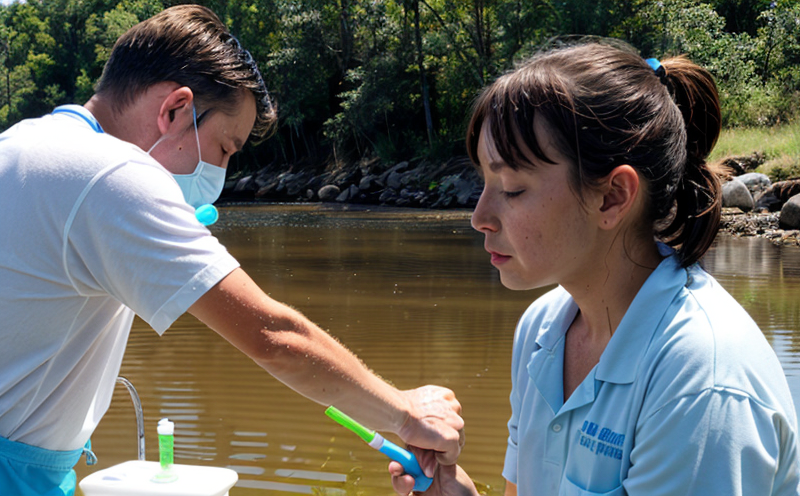ASTM D5391 Silica Test in Water Validation Method Development Test
The ASTM D5391 test method is widely recognized as a standard for validating silica content in water samples. This service focuses on developing and validating the accuracy of silica testing methods used in environmental quality management, particularly in potable water supplies. Silica, when present at high levels, can lead to scaling issues in water distribution systems, which affects both the efficiency and lifespan of these systems.
The ASTM D5391 method involves a colorimetric analysis using ammonium molybdate and stannous chloride as reagents. This technique is sensitive enough to measure silica levels down to 0.2 mg/L. The process begins with the collection and preservation of water samples, followed by filtration to remove particulates that could interfere with the test.
During method development, it’s crucial to ensure that the testing apparatus meets the specified criteria laid out in ASTM D5391. This includes precise pipetting techniques and accurate weighing methods for reagents. The temperature control of the water samples is also critical as fluctuations can affect the colorimetric reactions.
The validation process involves comparing results from multiple laboratories using different instruments to ensure consistency across the board. This ensures that the method remains reliable even under varying conditions, which is essential for maintaining compliance with regulatory standards such as those set by the World Health Organization (WHO) and the U.S. Environmental Protection Agency (EPA).
Our team of experts will guide you through each step of this process, ensuring that your testing method adheres to ASTM D5391 specifications. We provide comprehensive support for both initial setup and ongoing validation, helping ensure long-term accuracy in your water quality assessments.
Industry Applications
The ASTM D5391 silica test method finds application across various industries where potable water quality is critical. In the healthcare sector, ensuring clean drinking water is paramount to prevent contamination that could lead to infections or other health hazards. For food and beverage companies, maintaining high standards of hygiene in their production processes ensures product safety.
- Healthcare facilities: Ensuring potable water quality helps maintain a sterile environment, reducing the risk of cross-contamination.
- Food & Beverage Industry: Clean water is essential for brewing and processing to prevent microbial contamination.
- Pharmaceuticals: The purity of water used in drug manufacturing processes directly impacts product safety.
International Acceptance and Recognition
The ASTM D5391 method is internationally recognized for its reliability and accuracy. It has been adopted by countries like the United States, Canada, Australia, and parts of Europe for validating silica content in water.
- Australia: Standards Australia (AS) has adopted this method as a reference standard for potable water quality assessment.
- United Kingdom: The British Standards Institute (BSI) recommends ASTM D5391 for validating silica levels in drinking water.
- European Union: Several member states use ASTM D5391 to ensure compliance with EU directives on water quality.
Use Cases and Application Examples
This service is particularly useful for organizations involved in the testing, validation, and certification of potable water supplies. Here are some specific use cases:
- Water Treatment Plants: Regularly validate silica levels to ensure optimal treatment processes.
- Regulatory Bodies: Use ASTM D5391 as a benchmark for compliance checks and audits.
- Research Institutions: Develop new methods or refine existing ones based on accurate silica measurements.





